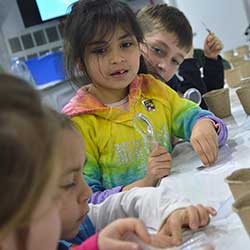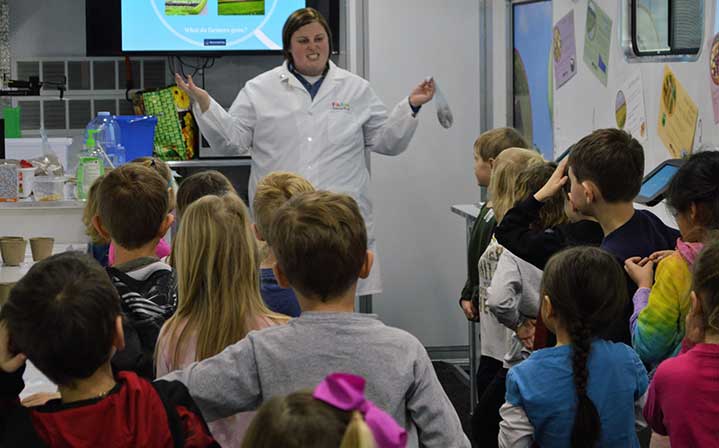Murray Lake Elementary kindergartners filed into a 40-foot mobile classroom parked just outside their school, and prepared to be quizzed on their knowledge of agriculture.
First question: what is agriculture?
“I think it is soil,” said Rosalee Romano.
Another student guessed it had to do with vitamins for plants.

A third recognized and called out a combine on the screen behind Lindsay Grasman, a science lab educator at Food, Agriculture & Resources in Motion (FARM). Farmers use combines, he said.
“And what does a farmer do?” Grasman asked.
Rosalee bounced in place in her rainbow-colored sneakers, her hand raised high. “He helps the plants and the animals on his farm, just like I do when I feed the pig with my dad.”
Every kindergartner got to be a farmer of sorts by planting a corn or green bean seed into a biodegradable pot of peat, which they were invited to take home and grow. Other grades studied different areas such as renewable and nonrenewable resources, and the impact of temperature on food and bacteria growth.
“They love the hands-on aspect of it,” Grasman said. “A lot of them are realizing they know more than they think. But a third-grader did tell me last week, ‘You just blew my mind.’ ”
Murray Lake is one of three Kent ISD districts piloting the FARM program through the Michigan Farm Bureau’s Agriculture in the Classroom initiative. It continues through June at schools in Oakland County.

The purpose, Grasman said, is to help teach students about how food gets to the table and the role of agriculture in their lives. The mobile lab is equipped with tablets and other technologies for presenting lessons tied to Next Generation Science Standards, a set of teaching guidelines for kindergarten through 12th-graders.
Murray Lake first-grade teachers have been working with the Farm Bureau to bring science through agriculture into their classrooms. This year students have been visited by a pair of calves and, most recently, received eggs to be incubated in their classrooms.
Agriculture is Michigan’s second largest industry, contributing more than $101 billion to the state’s economy, according to the Michigan Agriculture in the Classroom website. Michigan produces more than 300 commodities, making it the state with the second most diverse agriculture industry in the nation, behind California.
CONNECT
Michigan Agriculture in the Classroom










